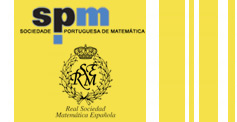

Dynamical Systems and Pseudorandom Number Generation
There are many problems that are known to be dificult or impossible to solve using deterministic algorithms. One example is the following: Given two computer programs, prove that they are equivalent, i.e for same inputs, the outputs are equals. The normal approach to solve this problems are the Monte Carlo methods. A Monte Carlo method, in simple and general terms, is any algorithm that uses random numbers. Random number generation is dificult by definition. Although there are ways to generate random numbers using a computer, it is ineficient by definition, a computer is a deterministic machine. A way around would be the following, to generate sequence of numbers that simulate "randomness". Any algorithm that uses pseudorandom numbers sequences is known as a Quasi-Monte Carlo method. The main purpose of this talk is to introduce a collection of good pseudorandom sequences generated by dynamical systems from a purely theoretical point of view as well as in view of diferent applications. We analyze the pseudorandom sequences using mainly number theoretic methods as for example exponential sum techniques.



